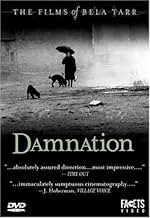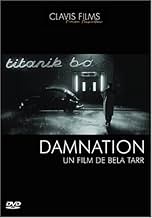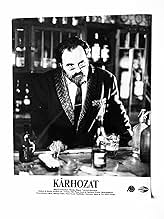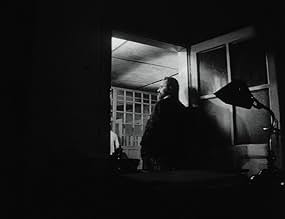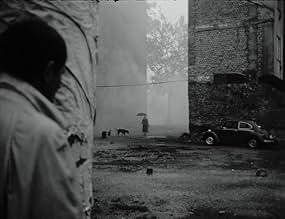Kárhozat
- 1988
- 2h
CALIFICACIÓN DE IMDb
7.6/10
7.2 k
TU CALIFICACIÓN
Agrega una trama en tu idiomaA lonely barfly falls in love with a married bar singer.A lonely barfly falls in love with a married bar singer.A lonely barfly falls in love with a married bar singer.
- Dirección
- Guionistas
- Elenco
- Premios
- 2 premios ganados y 1 nominación en total
- Dirección
- Guionistas
- Todo el elenco y el equipo
- Producción, taquilla y más en IMDbPro
Opiniones destacadas
The film that launched director Béla Tarr into international attention, Kárhozat is the Hungarian's first major investigation of the nature of humanity.
Trailing the exploits of alcoholic depressive Karrer, Kárhozat presents us with a view of a desolate and decrepit Hungarian town. He spends his days wandering from bar to bar, obsessing over a married lounge singer and part-time lover whom he longs to elope with. Passing off a job to collect a package to the husband, he buys himself three days alone with the object of his desires.
As is now his trademark, Tarr brings us the minimal number of shots: slow, winding, thoughtful and beautiful. His approach is simultaneously simple and complicated, showing us at the same time nothing and everything. The aesthetic of the film is astounding, beauty created wonderfully in the chaos and destruction of the landscape. The brooding intensity of the omnipresent coal trains dominates the work, an indicator of lost industry and decline. Miklós Székely leads the cast with the perfect stoic facade, his granite face holding back the weight of an emotional past and the crippling need for escape. The sinister and critical bartender gives us Karrer's true opinion of himself, one he would rather not face up to, whilst the sagacious old woman provides the film's sensibility and reason. The plot itself is not so important as the camera's journey and the character's silent ruminations, leading unavoidably to a wonderful climax and one which does exactly what it should: causes us to question our own lives and the oddity of humankind.
With beautiful, paced, unconventional direction, Tarr gives us an intimate portrait of ourselves and our world. Achieving an incredible amount with a minimalistic approach, the film is entrancing, mysterious, and inspiring. Telling us as much with his landscapes as with his characters, Tarr's Kárhozat is a testament to the brilliance of this creative juggernaut.
Trailing the exploits of alcoholic depressive Karrer, Kárhozat presents us with a view of a desolate and decrepit Hungarian town. He spends his days wandering from bar to bar, obsessing over a married lounge singer and part-time lover whom he longs to elope with. Passing off a job to collect a package to the husband, he buys himself three days alone with the object of his desires.
As is now his trademark, Tarr brings us the minimal number of shots: slow, winding, thoughtful and beautiful. His approach is simultaneously simple and complicated, showing us at the same time nothing and everything. The aesthetic of the film is astounding, beauty created wonderfully in the chaos and destruction of the landscape. The brooding intensity of the omnipresent coal trains dominates the work, an indicator of lost industry and decline. Miklós Székely leads the cast with the perfect stoic facade, his granite face holding back the weight of an emotional past and the crippling need for escape. The sinister and critical bartender gives us Karrer's true opinion of himself, one he would rather not face up to, whilst the sagacious old woman provides the film's sensibility and reason. The plot itself is not so important as the camera's journey and the character's silent ruminations, leading unavoidably to a wonderful climax and one which does exactly what it should: causes us to question our own lives and the oddity of humankind.
With beautiful, paced, unconventional direction, Tarr gives us an intimate portrait of ourselves and our world. Achieving an incredible amount with a minimalistic approach, the film is entrancing, mysterious, and inspiring. Telling us as much with his landscapes as with his characters, Tarr's Kárhozat is a testament to the brilliance of this creative juggernaut.
In the oeuvre of Bela Tarr ugliness is elevated to art. In this respect "Damnation" is a good example because there is a lot of ugliness in it.
Ugli landscapes. In the opening scene we see, for minutes and minutes, an industrial conveyor belt. We shall see it again and again.
Unsympathetic people. The film is about three men in love with the same woman. The woman tries to use the men to enhance her career. The men fight each other in sneaky ways.
Bad weather. In "Damnation" it rains all the time. Even in interior scenes there is water leaking from the ceiling. In this respect Tarr resembles Andrei Tarkovski, who also has the "inside shower" as a trademark.
Bela Tarr is renowned for his long takes with a slow moving, nearly static camera. When combined with monotonous music these scenes sometimes become nearly hypnotic. In "Damnation" there are two of these scenes. The first is the performance of the female singer in the nightclub "Titanik", the second one is the local dance evening.
Apart from the three men and the woman, there is also an old lady in the movie that warns the lead character multiple times. Her function in the story was not entirely clear to me.
Very clear however is the symbolism with streetdogs, who populate the streets for most of the film. They evidently feel very much at home in this ugly environment. At the end of the film the lead character even has a (temporary) transformation to (the level of) a streetdog.
Ugli landscapes. In the opening scene we see, for minutes and minutes, an industrial conveyor belt. We shall see it again and again.
Unsympathetic people. The film is about three men in love with the same woman. The woman tries to use the men to enhance her career. The men fight each other in sneaky ways.
Bad weather. In "Damnation" it rains all the time. Even in interior scenes there is water leaking from the ceiling. In this respect Tarr resembles Andrei Tarkovski, who also has the "inside shower" as a trademark.
Bela Tarr is renowned for his long takes with a slow moving, nearly static camera. When combined with monotonous music these scenes sometimes become nearly hypnotic. In "Damnation" there are two of these scenes. The first is the performance of the female singer in the nightclub "Titanik", the second one is the local dance evening.
Apart from the three men and the woman, there is also an old lady in the movie that warns the lead character multiple times. Her function in the story was not entirely clear to me.
Very clear however is the symbolism with streetdogs, who populate the streets for most of the film. They evidently feel very much at home in this ugly environment. At the end of the film the lead character even has a (temporary) transformation to (the level of) a streetdog.
Yes, this is not for every movie goer. But it rewards those who love the art of film making. Very stylized, yes, but directed by someone who has chosen film as his medium for expresses and articulating a world view that is bleak, atheistic and unforgiving. You may not "like" this film: but as an antidote to all that is superficial, crass and commercial it is terrific. To some, it is intellectual masturbation: to those who see film as an art form, a movie to be admired, debated and savored. It will be seen by fewer than those who enter any "Blockbuster" video store on any given day- but, God help me, I would rather see this film than any other at that store.
Damnation was one of those rare instances when I felt both frustrated and fascinated by the film I was watching. Bela Tarr is SO adept at creating mood that the light sketches of plot began to feel superfluous, and I found myself wanting to brush them away and just float in this surreal sludge without trying to follow a 'story'. Tarr's use of sound design and music to create tension and a dream-like state come closer to David Lynch's than anything else I've seen. The original (I'm assuming) songs in the film also share that distinctive quality of mimicking a certain genre of familiar music, while having something that's a bit off about them - much like Badalamenti's scores. Interesting to note that Blue Velvet was released two years prior. The slowly gliding camera, which seems to have almost it's own agenda aside from the film ads to the purveying sensation of unease, and the exquisite lighting and black and white tones are breathtakingly stark. There are moments in the film when there is so much going on in the scene, and the shot is so lengthy, that the situation itself becomes real and transcends the fiction of the film. This is a very rare phenomenon in film, and was absolutely spellbinding - especially the dance scene. The middle of the film gets heavy with bleak philosophical exchanges, which would be better illustrated than told - especially with Tarr's incredible gift for mis en scene and sound design. Iconographic sequences like the slow pan past the miserable crowds waiting for the rain to stop, or the reoccurring pack of wild dogs speak volumes more of Tarr's theme than the most eloquent words. The characters are like automatons shuffling about in a purgatory from which there is no escape. It is as though the entire world was a flea-bag apartment building, a tattered old bar, and a vast field of mud and debris which one must traverse between the two.
Damnation (1988) ****
Although he made a number of feature films previous to Damnation, this is where Bela Tarr found his trademark style. It was also his first collaboration with novelist and country man Laszlo Krasznahorkai; a collaboration which continues to this day.
The film opens with now trademark Tarr style, watching mining carts travel along with their loads for a few minutes (yes minutes). The camera slowly pulls back to reveal Karrer (Miklós Székely) shaving. He's a lonely loser, slowly drinking himself to death at the Titanik Bar. He is in love with and sleeping with the lounge singer there (Vali Kerekes). The problem, however, is that she is married, and has made no secret of wanting to end their affair. That when he asks her why she doesn't love him, and she replies "I love you and you know it," is of no real matter to her.
Karrer is offered a smuggling job by the bar's shady owner. He decides to offer the job to the singer's husband, who has built up a substantial debt and is in danger of being imprisoned for it. He accepts, and Karrer wins himself three days to swoon the singer. She denies him, nevertheless sleeping with him in perhaps the least passionate sex scene ever filmed. A bitter Karrer decides he will turn in to the authorities her husband when he returns from his smuggling job, leaving her alone and thus making him now the logical option. By the end, the lives of Damnation's characters will be as broken and desolate as the crumbling town in which they live.
Damnation plays as love triangle, grounded out over nearly two hours. Tarr's long shots and elegantly bleak black and white photography follows ever so slowly the action. The lighting is impeccable, creating ghostly silhouettes, dusty and dim barrooms, and elegant and shimmering light bouncing of the face and hair of the lounge singer. As characteristic of Bela Tarr, the cinematography is stately and assured, breathtaking and deliberate. He films his characters and their town as assuredly and respectfully as possible. The town, and the dogs which walk its streets, hint at the apocalyptic undertones of the film, and transcends all emotions, or lack there of.
I have had reservations about Damnation in the past, confident that it was film-making at its very best, sublimely atmospheric and tonal, but unsure whether or not just how well it worked, particularly in relation to Tarr's two formidable masterpieces, Satantango and Werckmeister Harmonies. Those films have something mammoth and intimidating about them: Satantango, with its titanic length, clocking in at over 7 hours, all in the same style and minimal narrative; Werckmeister Harmonies with its bizarre metaphysical underpinnings and suggestive philosophy. Those films have a ground out dreamlike or perhaps nightmarish quality to them, particular Werckmeister Harmonies. After my fourth of fifth viewing of Damnation, I'm now assured that it does in fact work particularly when you avoid getting hung up on Tarr's other films. I'm also assured of its greatness. Damnation is a masterpiece of film-making. It draws parallels with the Italian realist films of the 50s and early 60s, as well as the minimalist transcendentalism of the films of Robert Bresson, but all the while invoking a dreamlike quality that keeps the viewer removed at just the right distance for a gritty but transcendent experience.
Although he made a number of feature films previous to Damnation, this is where Bela Tarr found his trademark style. It was also his first collaboration with novelist and country man Laszlo Krasznahorkai; a collaboration which continues to this day.
The film opens with now trademark Tarr style, watching mining carts travel along with their loads for a few minutes (yes minutes). The camera slowly pulls back to reveal Karrer (Miklós Székely) shaving. He's a lonely loser, slowly drinking himself to death at the Titanik Bar. He is in love with and sleeping with the lounge singer there (Vali Kerekes). The problem, however, is that she is married, and has made no secret of wanting to end their affair. That when he asks her why she doesn't love him, and she replies "I love you and you know it," is of no real matter to her.
Karrer is offered a smuggling job by the bar's shady owner. He decides to offer the job to the singer's husband, who has built up a substantial debt and is in danger of being imprisoned for it. He accepts, and Karrer wins himself three days to swoon the singer. She denies him, nevertheless sleeping with him in perhaps the least passionate sex scene ever filmed. A bitter Karrer decides he will turn in to the authorities her husband when he returns from his smuggling job, leaving her alone and thus making him now the logical option. By the end, the lives of Damnation's characters will be as broken and desolate as the crumbling town in which they live.
Damnation plays as love triangle, grounded out over nearly two hours. Tarr's long shots and elegantly bleak black and white photography follows ever so slowly the action. The lighting is impeccable, creating ghostly silhouettes, dusty and dim barrooms, and elegant and shimmering light bouncing of the face and hair of the lounge singer. As characteristic of Bela Tarr, the cinematography is stately and assured, breathtaking and deliberate. He films his characters and their town as assuredly and respectfully as possible. The town, and the dogs which walk its streets, hint at the apocalyptic undertones of the film, and transcends all emotions, or lack there of.
I have had reservations about Damnation in the past, confident that it was film-making at its very best, sublimely atmospheric and tonal, but unsure whether or not just how well it worked, particularly in relation to Tarr's two formidable masterpieces, Satantango and Werckmeister Harmonies. Those films have something mammoth and intimidating about them: Satantango, with its titanic length, clocking in at over 7 hours, all in the same style and minimal narrative; Werckmeister Harmonies with its bizarre metaphysical underpinnings and suggestive philosophy. Those films have a ground out dreamlike or perhaps nightmarish quality to them, particular Werckmeister Harmonies. After my fourth of fifth viewing of Damnation, I'm now assured that it does in fact work particularly when you avoid getting hung up on Tarr's other films. I'm also assured of its greatness. Damnation is a masterpiece of film-making. It draws parallels with the Italian realist films of the 50s and early 60s, as well as the minimalist transcendentalism of the films of Robert Bresson, but all the while invoking a dreamlike quality that keeps the viewer removed at just the right distance for a gritty but transcendent experience.
¿Sabías que…?
- TriviaWith "Kárhozat / Damnation", the first of his collaborations with novelist Laszlo Krasznahorkai, Bela Tarr adopts a formally rigorous style, featuring long takes and slow tracking shots of the bleak landscape that surrounds the characters.
- ErroresIn the Dance/Party scene, the band and the music are clearly out of sync.
- Citas
The Singer: I like the rain. I like to watch the water run down the window. It calms me down. I don't think about anything. I just watch the rain.
- ConexionesEdited into Gli ultimi giorni dell'umanità (2022)
Selecciones populares
Inicia sesión para calificar y agrega a la lista de videos para obtener recomendaciones personalizadas
- How long is Damnation?Con tecnología de Alexa
Detalles
- Tiempo de ejecución2 horas
- Color
- Mezcla de sonido
- Relación de aspecto
- 1.66 : 1
Contribuir a esta página
Sugiere una edición o agrega el contenido que falta



